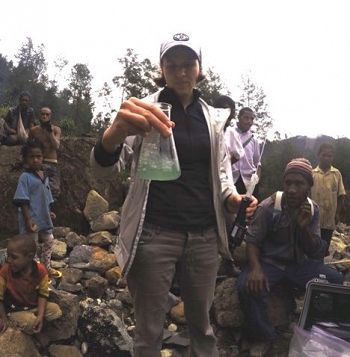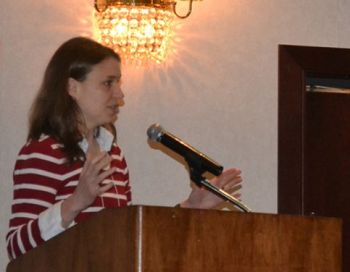Critical Zone Profile – TESS RUSSO (hydrologist, assistant professor)
26 Sep 2016
Assistant Professor; Department of Geosciences; The Pennsylvania State University
Tess Russo is a hydrologist researching hydrologic system responses to environmental change with the objective of informing restoration and management decisions. Russo is an Assistant Professor in the Department of Geosciences at Penn State. She has a B.S. in Mechanical Engineering from Tufts University, a Ph.D. in Earth and Planetary Sciences from the University of California, Santa Cruz, and was an Earth Institute Postdoctoral Fellow at Columbia University. Her research includes quantifying components of the groundwater budget, modeling vadose zone infiltration rates, estimating natural groundwater recharge, optimizing managed recharge projects, and assessing impacts of agricultural intensification on water resources.
"The big-picture goal of my work is to improve the way humans interact with and protect our natural resources." - Tess Russo
My work aims to improve our understanding of hydrologic system dynamics as they are perturbed by climate and human actions. At the Shale Hills Critical Zone Observatory (CZO), we are investigating environmental controls on ground water-surface water interactions and stream solute concentration-discharge patterns.
My research addresses water quantity and quality issues which are directly relevant to agricultural and community water management. Results from our research at the CZO sites can help predict solute concentrations in spring water, ground water, and surface water across multiple lithologies and land uses. This work can inform water resource protection and treatment plans.
The CZO is a complex system of systems, requiring an interdisciplinary group of scientists to work together, account for exogenous factors in their work, and build a more complete context and understanding of processes that used to be studied in isolation.
The Critical Zone (CZ) encompasses the layers of Earth that support life. CZ scientists study the processes occurring in this system, and the ways in which human activity alters them. Surface water and shallow ground water support human and ecological demands, maintaining life at the land surface. Soil production and microbial activity are integral to forest health and agricultural activities. At times, these resources were misunderstood and taken for granted, leading to environmental and economic problems.
As a new professor, the CZO provided a valuable network of researchers at my institution and around the country. A CZO is a complex system of systems, requiring an interdisciplinary group of scientists to work together, account for exogenous factors in their work, and build a more complete context and understanding of processes that used to be studied in isolation. Having the opportunity to meet and work with this diverse group of researchers has been incredibly motivating, and has improved our understanding of hydrologic processes.
CZO research helps unravel complex questions with respect to water management, regarding water transport and quality. The CZOs address critical questions related to snow accumulation and snowmelt, which are key to water supply management in the Western U.S. The Intensively Managed Landscapes CZO and others improve our understanding of the dynamics between agricultural activity, land, and water resources. Though our core focus is fundamental science, discoveries made on CZ processes will naturally inform the management of CZ resources.
Tess Russo, Penn State
Tess Russo
Tess Russo
News Category:
PEOPLE
Related News
Explore Further







